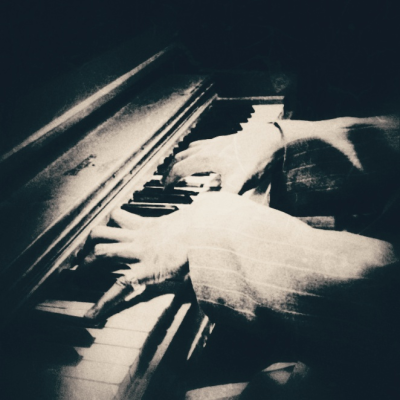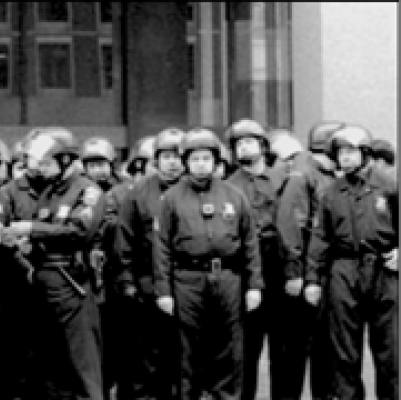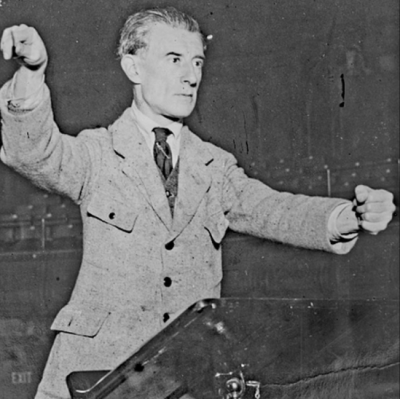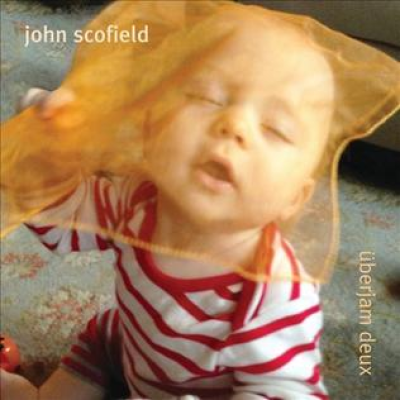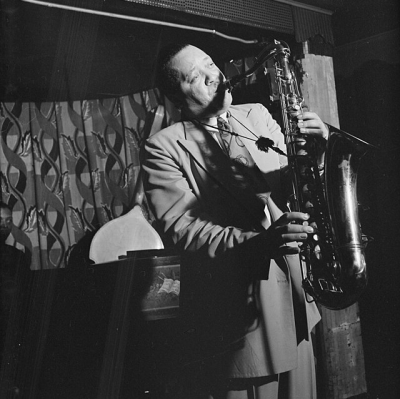.
.
Listen to “Janet,” a 1953 recording by Duke Ellington, with Wendell Marshall (bass) and Butch Ballard (drums) [Universal Music Group]
.
.
Yalies Save Ellington Tune From Obscurity
by Janet Lever, with Brad Dechter
.
…..When I walked into our New Haven, Connecticut townhouse on the evening of my 32nd birthday, I was surprised to see a small group of young musicians—past members of the Yale Jazz Ensemble—crammed into our living room, their instruments poised to play. It was the most unusual birthday gift I was ever to receive, and—I’m ashamed to admit my ignorance—one I grossly underrated at the time. My boyfriend Stanton Wheeler, a professor in the Yale Law School, was the only faculty member to have joined a recent incarnation of that big-band student group. Stan played the flugel horn on a little-known tune titled “Janet” that night, December 5, 1978. Was that my present?
…..“Janet” is from a 1953 recording featuring Duke Ellington in a rare trio setting performing his own original works on the aptly-titled album “The Duke Plays Ellington.” After starting as an up-tempo swinging melody in a traditional 32-bar AABA form, the tune makes an unexpected transition to a soulful 8-bar phrase played twice as a slow, plaintive ballad before recapitulating the original up-tempo theme. OK, the song and I had the same name, and it was impressive to be serenaded by enormously talented musicians, but was that all? What exactly was the gift?
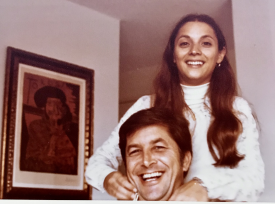
Janet Lever and Stanton Wheeler, c. late 1970’s
…..Stan had an impressive old jazz record collection with a designated turntable for his 78 rpms. He worshipped Duke Ellington as the greatest jazz composer and bandleader of his era. Fond of the quirky 2:15-minute tune “Janet” on his treasured copy of “The Duke Plays Ellington,” Stan tried to find sheet music for the song to play for me, then conceded it just didn’t exist. His brainstorm: Hire Brad Dechter, a very talented composer/arranger who he knew was well-versed in Ellingtonia thanks to his main jazz mentor Bill Berry, a cornetist in Duke’s band in the ‘60’s. He asked Brad, then a saxophone major in the Yale School of Music, to create an extended version of the slow section of the song by composing a “bridge” or “refrain” that would make it a traditional AABA-form ballad.
…..In effect, Stan was asking a graduate music student to collaborate with the great Ellington, posthumously. Specifically, he asked Brad to remove the faster “patter part” and preserve the most romantic section of a song that had slipped into obscurity so that it could be recast as a sentimental tribute to me.
…..Stan and I broke up in 1980. He died in 2007. Until the pandemic, the Yale Law School hosted an annual Stan Wheeler Memorial Jazz Concert featuring the current 18-member Yale Jazz Ensemble and the Reunion Jazz Ensemble, a septet of select members of Stan’s jazz “family,” including guys who played at my birthday party. The first concert doubled as a community memorial service. His first wife, the mother of his children, and his current wife were in attendance, of course; it seemed fitting that I was not invited. When Stan’s best friend sent me a program and a DVD of the service, I was shocked that “Janet” was among the songs chosen to play. I could only hope the inclusion was not painful to anyone after so many years had passed. It was a song Stan was proud to have resurrected, and it made me feel like my years shared with him had been honored.
…..So who was the eponymous Janet? Brad Dechter revealed the answer in a long email I received on December 5, 2020, my 74th birthday. With pandemic cleaning of files, I found Stan’s sheet music for “Janet.” I felt I ought to try to offer it to Brad in case it was a fading memory, as Stan would have wanted Brad’s work product preserved. Not being in touch for four decades is no problem in the era of Googling. Seeing Brad’s impressive lists of accomplishments on his IMDB pages brought a smile to my face. Brad anticipated a career in New York City after earning his Master of Music degree at Yale, but a short trip back to his native LA got him involved in the jazz and big band scene here (I too had migrated to LA for jobs). Brad has orchestrated or arranged music for over 300 feature films and beloved TV shows. Not finding an email address, I sent a message to his public Facebook page, offering my sheet music and contact information. He wrote me a day later, updating me with several great stories of the enduring fate of “Janet,” ending each with “but wait, there’s more.”
…..Turns out Brad had been an excellent steward for the song. In LA’s 1980 big band scene Brad met Buddy Childers, famous for playing lead trumpet with the Stan Kenton Orchestra. Buddy asked him for some custom arrangements, and Brad included a big band version of “Janet” that he had written for the all-female Maiden Voyage Big Band. Buddy subsequently performed the tune all across the U.S.
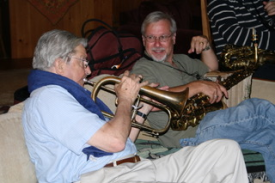
Stanton Wheeler and Brad Dechter
…..Now his stories got real interesting. One night in the early ‘80s, Maiden Voyage (including Brad’s sister Lesli on tenor sax) was playing at Carmelo’s Jazz Club, then a main jazz hangout in LA’s San Fernando “valley.” Brad was listening at the bar, delighted that the club was so busy and the band sounded so great; in its second set, they performed “Janet” to much applause. On break before the third set, bandleader Ann Patterson informed Brad that there was an older gentleman named Dave Dexter in a booth at the back of the club who wanted to meet him.
…..Dave Dexter, Jr., a music journalist in the late 1930s, by the 1940s was an executive and producer at Capitol Records. He signed Frank Sinatra, Nat King Cole, Woody Herman, the Duke and many other notable artists to the label. Dave asked Brad very specific questions about how he found “Janet” and why he arranged it. Dave explained that he had produced the album with the original tune; at the end of the recording session Dexter informed the Duke that the record was just a few minutes short. Did Duke have an extra song to add? Duke sat down to play what he called a “little ditty that he had in his head” that he hadn’t gotten around to performing or finessing. Thinking it a perfect fit, Dave asked for the title. It had none yet, so Dave asked Duke, “Would you mind if I name this song after my daughter who was born just this past week?” Duke readily agreed and Dave’s newborn daughter Janet was immortalized in song.
…..“Wait, there’s more!” wrote Brad. Dave had never heard the song played by a contemporary band. What most astounded him about the timing of hearing it at Carmelo’s was that, only the night before, Dave had listened to the original Duke recording for the first time in over 20 years. “And so, dear Janet, on your 74th birthday, you get ‘the rest of the story.’ You should be proud that at least we know YOU too are immortalized in this newest incarnation of the song, now itself 42 years old! Happy Birthday!”
…..Only in writing this memoir essay, with major assist from professional arranger/composer Brad Dechter, do I finally understand what he and Stan created together. It’s taken me 42 years to fully appreciate the magnitude of the gift they gave me. Thanks to Stan’s romantic and Dukish inclinations and Brad’s achievements in the world of music, Ellington’s and Dave Dexter’s “Janet” got a delightfully unexpected new life path. A bit of lost legacy of the Duke’s has been preserved for the ages.
.
.
___
.
.
Janet Lever (Yale Ph.D.’74) is a writer and professor emerita in Los Angeles. Her articles have appeared in Playboy, Glamour, Ms., ELLE, and LA Magazine.
Brad Dechter (Yale BA 1978: MM 1979) lives in Los Angeles and is an arranger/composer for film and TV.
.
.
___
.
.
Click here to learn how to submit your own True Jazz Story
Click here to subscribe to the Jerry Jazz Musician newsletter
.
.
.






